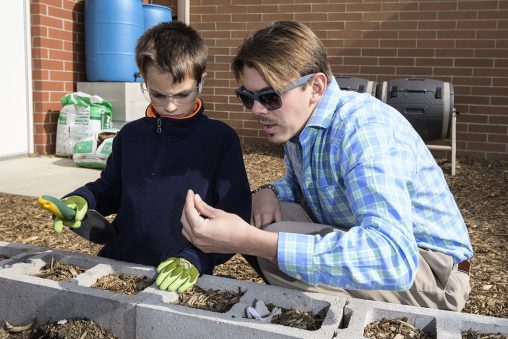 Wright State University students who plan to become elementary, middle or high school teachers have a new kind of textbook for their methods courses. They just have to log on to the online National Science Teachers Association (NSTA) learning center.
Wright State University students who plan to become elementary, middle or high school teachers have a new kind of textbook for their methods courses. They just have to log on to the online National Science Teachers Association (NSTA) learning center.
NSTA has announced that Wright State is one of its collaborating partners. NSTA is an organization of science teachers around the world that promotes the sharing of content about teaching science, such as journal articles, classroom ideas and informational videos and podcasts.
“In some ways it’s kind of like social media for teachers, they can share content online and network with teachers, not just in Ohio or the United States, but all over the world who are accessing this information,” said Michelle Fleming, associate professor of science and mathematics education and director of the Early Childhood Education Program in the Wright State College of Education and Human Services.
“It takes professionalism up a notch and gives teacher candidates a network of educators who have a more worldly view,” said Fleming, who is a long-time member of NSTA.
Fleming encourages her teacher candidates not only to join NSTA, but also to share their own content on the website. Students earn digital badges for their online accomplishments and valued contributions to the learning center.
“It’s a multimedia suite of information,” she said. “By doing this, we have a unique relationship with NSTA. They know we utilize them for coursework as our teacher candidates earn a variety of digital badges, and as a result, they promote our own institution on their website. This is an opportunity for the teacher candidates to showcase personal leadership and professional development in science education.”
As the teacher candidates select and read material they prefer or feel they need for personal growth, they build a virtual library of resources that include lesson plans, scientific articles, videos and webinar presentations.
Fleming said the partnership with NSTA has had a strong impact on her own learning and teaching.
“It really changed my life, it changed my teaching, it helped me reflect and challenge myself to be a better science teacher, and my hope is that it inspires my students’ teaching and challenges them to think more creatively and critically about teaching science. The content is always changing and growing on the learning center,” she said.
Teacher candidates are encouraged to join professional listservs, connect with other registered educators to discuss teaching and promote more sophisticated conceptions of science content, as well as discuss bias in different curricular resources.
“It’s an amazing partnership,” Fleming said. “The NSTA provides access to credible up-to-date material that’s been peer reviewed by scientists and science educators, which is very important. I know as a teacher, I need to present different views and know whose views I’m representing. I need to ensure I bring in other perspectives and viewpoints. Science is social, dynamic and creative. By partnering with the NSTA, collaboratively, we promote excellence and innovation in science teaching and learning in our coursework and teacher education programs.”

 Wright State alum Lindsay Aitchison fulfills childhood space-agency dream
Wright State alum Lindsay Aitchison fulfills childhood space-agency dream  Wright State business professor, alumnus honored by regional technology organizations
Wright State business professor, alumnus honored by regional technology organizations  Wright State University Foundation awards 11 Students First Fund projects
Wright State University Foundation awards 11 Students First Fund projects  Gov. DeWine reappoints Board Treasurer Beth Ferris and names student Ella Vaught to Wright State Board of Trustees
Gov. DeWine reappoints Board Treasurer Beth Ferris and names student Ella Vaught to Wright State Board of Trustees  Joe Gruenberg’s 40-Year support for Wright State celebrated with Honorary Alumnus Award
Joe Gruenberg’s 40-Year support for Wright State celebrated with Honorary Alumnus Award 